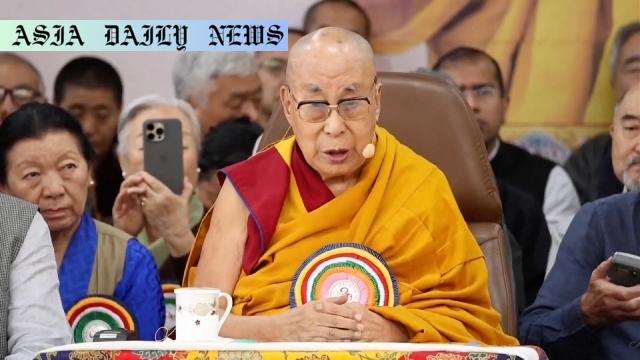Dalai Lama: China’s stance on successor approval sparks debate
China reiterated Beijing’s authority over Dalai Lama’s successor selection.
The Tibet Autonomous Region highlighted China’s infrastructural achievements.
The Dalai Lama reaffirmed traditional Tibetan methods for successor selection.
China’s assertion aligns with its longstanding political stance on Tibet.

China’s Stance on the Dalai Lama’s Reincarnation
In a significant reiteration of their stance, Chinese officials from the Tibet Autonomous Region have declared that the central government in Beijing has the ultimate authority over selecting the successor of the 14th Dalai Lama. The announcement was made during a press conference held ahead of the 60th anniversary of the establishment of the Tibet Autonomous Region, underscoring the Chinese Communist Party’s continued grip over Tibetan affairs. Officials emphasized that Beijing’s decision on the reincarnated successor is final and non-negotiable, marking another chapter in the long-standing conflict over Tibet’s spiritual and administrative governance.
The Historical Context of Tibetan Succession
Historically, the selection of a Dalai Lama’s successor follows an intricate set of spiritual rituals and traditions, deeply rooted in Tibetan Buddhism. This practice has long been directed by senior monks, high lamas, and practitioners within the Tibetan community, without external interference. The 14th Dalai Lama, Tenzin Gyatso, himself reaffirmed this process during his 90th birthday celebration, stating that his successor would be chosen solely in accordance with Tibetan customs. Refusing any outside intrusion, he highlighted the cultural and spiritual autonomy his people hold sacred.
China’s Justification and Broader Implications
China’s assertion of authority over the Dalai Lama’s reincarnation is rooted in its political strategy to maintain territorial sovereignty over Tibet. By taking control of this distinctly spiritual process, Beijing seeks to undermine any efforts by Tibetan separatist groups that rely on the spiritual leader’s influence for mobilization. Chinese officials also spoke about their achievements in Tibet, pointing to improvements in infrastructure, income levels, and transport systems as evidence of the region’s development under Beijing’s governance. However, critics argue that the rhetoric around economic advancements often overshadows the broader cultural and human rights issues faced by Tibetans.
The Dalai Lama’s Role in the Tibetan Issue
As the spiritual leader living in exile since 1959 after the Chinese suppression of an uprising in Tibet, the Dalai Lama remains an essential symbol of peace and Tibetan resilience. While he has distanced himself from advocating outright independence, his “Middle Way” approach advocating Tibetan autonomy under Chinese governance has not gained substantial traction. Observers suggest that the debate surrounding his successor will further complicate the geopolitical tensions between China and Tibet’s supporters worldwide.
International Reactions and Future Prospects
The international community has been largely divided on the issue, with democratic nations recognizing the Dalai Lama’s influence and calling for dialogue between China and Tibetan representatives. Conversely, China views the Dalai Lama as a separatist figure with the potential to destabilize its control in the region. The successor issue will likely escalate diplomatic pressure on China, especially if Beijing proceeds unilaterally. The world is watching closely as this sensitive topic unfolds, likely influencing the cultural, spiritual, and political landscape of Tibet for generations.
Commentary
Beijing’s Assertion: A Political Move?
The Chinese government’s declaration regarding the reincarnation of the Dalai Lama is as much a political gesture as it is an administrative one. By asserting control over what is essentially a spiritual tradition, Beijing continues its effort to consolidate its authority over Tibetan culture and dispel any notion of separatism or autonomy. This move comes at a time when the world is increasingly aware of human rights issues in Tibet, further polarizing opinions globally. While the Chinese government claims to have made significant advancements in the region, these actions call into question the level of cultural freedom Tibetans are afforded.
A Cultural Legacy at Stake
The cultural legacy of the Dalai Lama is vast, transcending the borders of Tibet and influencing Buddhist communities worldwide. The unique process of identifying a reincarnated successor is deeply entwined with Tibetan identity and tradition, something that Beijing’s insistence threatens to undermine. The Dalai Lama’s own words regarding the independence of this process highlight the significance of preserving these rituals. Should Beijing intervene, it risks igniting greater resistance from Tibetans, both inside and outside of China. This is a battle not just over leadership, but over the very soul of Tibetan culture.
Global Implications and Stakes
The international community must carefully navigate this intricate situation. By weighing in, democratic nations may provide a counterbalance to China’s unilateral decision-making. However, these governments must also contend with the economic and diplomatic consequences of opposing Beijing. The question of the Dalai Lama’s successor reveals the larger geopolitical contest between cultural sovereignty and centralized governmental authority, a dynamic that will undoubtedly continue to evolve in the years to come.


